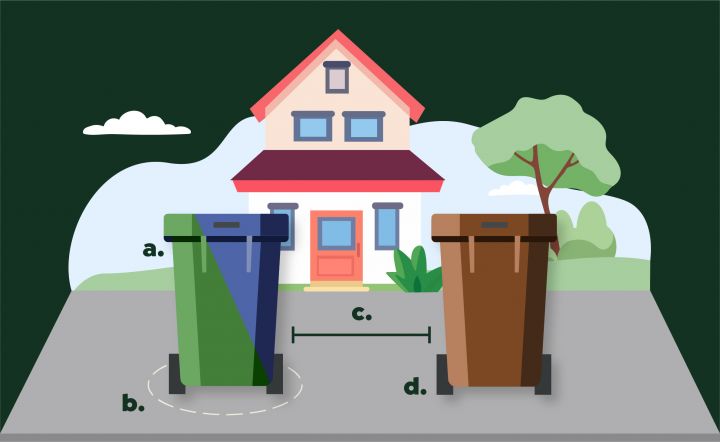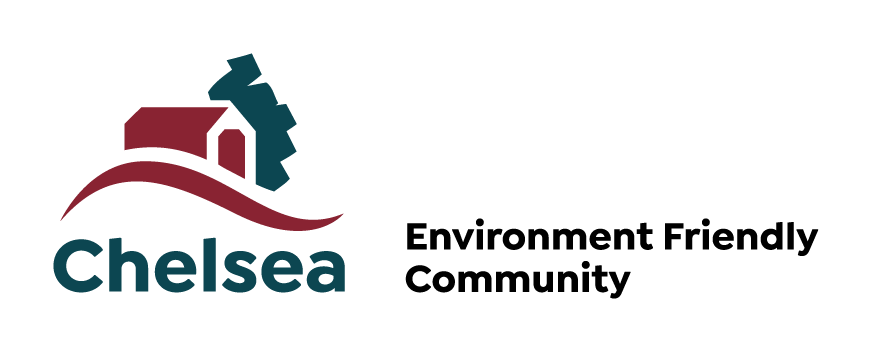
Compost collection
Residual materials (garbage, recycling, and compost) are collected by a truck equipped with a mechanical arm. To ensure proper collection, certain guidelines must be followed:
Accepted
-
Brown wheeled bins with a capacity of 120 or 360 litres equipped with a European plug.
-
Both wheels must be on the axle.
Refused
- Bins that do not meet the above standards
- Bags of leaves (unless there is a special collection during the weeks indicated in the collection calendar)
- Any item exceeding the authorized limit per collection.
If your bin is damaged, please contact the Public Works Department at 819 827-1160 or by e-mail at travaux.publics@chelsea.ca. An employee will come to your home and repair it free of charge.
Additional bins can be used for the compost collections if they comply with regulations. A maximum of six bins per collection is allowed for residential units.
Please note that additional bins can be ordered at the Town Hall reception desk. Bins are delivered on Thursdays or Fridays, while supplies last. Residents are responsible for covering the associated costs.
Position your bins correctly!
Make sure your bins are positioned correctly at the curb for efficient collection:
a. Lid closed, clear and unattached
b. No obstacles around the bins
c. Distance of at least 1 meter between bins
d. Wheels positioned towards the residence.

What goes in the brown bin?
Raw, cooked or spoiled food
- Coffee and coffee filters, tea and teabags
- Condiments*
- Cookies, candies, and desserts*
- Dairy products*
- Eggs and eggshells
- Fish and fish bones*
- Fruits and vegetables
- Herbs and spices
- Meat, poultry, and bones *
- Nuts and shells
- Pasta, bread, grains, and rice*
- Pet food*
- Seafood and seashells*
- Vegetable fats and salad dressings*
* Materials difficult to treat in home composters. Brown bin collection is your chance to get rid of them.
Soiled paper and cardboard
- Paper handkerchiefs, towels and napkins*
- Paper tablecloths, plates, cups, etc.*
- Soiled cardboard food containers and packaging (e.g., pizza boxes)*
Green waste
- Cold ashes
- Garden waste (except certain noxious or invasive plants listed on the website)
- Healthy or sick plants, indoor plants, and attached soil
- Leaves and lawn clippings
- Straw and hay
- Tree branches less than 1 metre long and 12 millimeters thick*
- Wood chips and sawdust
Things you can't put in your brown bin
- Absorbent pads from meat and fish
- Cat litter and animal excrement
- Certain noxious plants
- Cigarettes
- Dead animals
- Diapers and personal hygiene products (dental floss, sanitary pads, cotton swabs, etc.)
- Hair, finger- and toenails, fur, feathers
- Household hazardous waste (HHW, such as waste oil, batteries, paint)
- Plastic bags (even those marked biodegradable, oxobiodegradable , or compostable)
- Plasticized or waxed paper packaging (e.g., ice-cream containers)
- Soil, sand, and gravel (except soil attached to plants)
- Styrofoam
- Textiles
- Tree trunks and stumps
- Vacuum-cleaner waste
- Wood, cement, ceramics, and other CRD (construction, renovation, and demolition) waste
Compost Distribution
Date: May 17 & October 18, 2025
Time: 9 a.m. to 3 p.m.
Where: Municipal garage (119 Chemin Scott)
Residents are invited to get some compost at the municipal distribution. The compost collected in recent years on the territory is now mature and ready for use. This initiative, part of the “Nature and Environment” strategic pillar, enhances municipal compost collection and supports the actions of several environmental plans and policies.
On a first-come, first-served basis, the service is self-serve, so people wishing to collect compost should bring containers, shovels, and gloves.
Due to constant vehicle traffic at the municipal garage, we ask all parents to ensure their children remain close to a responsible adult.
Useful informations
Sorry—all plastic bags are banned from your brown bin, even those marked biodegradable or compostable. This reduces program costs. However, paper or waxed bags designed for this purpose are accepted.
If you’re already composting table scraps and green waste at home, municipal compost collection will fill in some gaps. The materials marked with an asterisk(*) on the list below can be a problem for home composters, whether you have an outdoor setup or a vermicomposter.
So you can choose to just keep on composting at home and use your brown bin as an environmentally friendly way to get rid of the materials your system can’t handle. Municipal collection can also come in handy when you have an unusual amount of yard and green waste to deal with.
Collect your household compostables in a specially designed kitchen catcher (available at hardware or big-box stores), or any plastic or metal container of your choice. Empty it regularly into your brown bin. To make things easier and more hygienic, you can line your kitchen catcher with small compostable paper bags, or your brown bin with large compostable paper bags. Paper bags can be purchased, or you can use folded newspaper.
No. Green waste should be placed in compost bins or in bags during special collections :
- The weeks of May 13, 20 and 27, 2025.
- The weeks of October 7, 14 and 28, 2025.
If your waste hasn't been picked up by the contractor by the end of the scheduled collection day, contact the Municipality the day after, within 24 hours.
Handy tips for dealing with compost problems
Put a big paper bag inside your bin for your compostables to go in, or line the bottom of the bin with newspaper or cardboard.
- Put your brown bin out every collection day, especially when it's hot. Between pickups, keep your bin in the shade and avoid full sun.
- Rinse your bin with soap and water or vinegar after every collection.
- Use closable paper bags inside the bin or top it off with a layer of newspaper or leaves each time you add compostables.
- Freeze meat and poultry leftovers and don't put them in till the day before your bin is collected.
- Let your leaves and grass clippings dry out before putting them into the bin so they don't start giving off ammonia.
Use the specially designed licking system or a bungee cord to keep the bin closed. You can also sprinkle the top of the bin with Cayenne pepper or spread some menthol around the edges. Take the same precautions as with household garbage. The safest place for your bin is in the corner of the garage with the door shut.
- Rinse your bin after your waste collectors empty it and leave the lid open in the sun to dry. You can also sprinkle them with baking soda or salt, spray them with vinegar, or rinse your bin with boiling water.
- Keep the lid closed at all times. Put out your compost on every collection day, especially when it's hot. Between times, keep your bin in the shade and avoid full sun.
- Layer your table scraps with dry material in the bin (like newspaper, sawdust, dead leaves, or paper towels).
- Keep meat and poultry leftovers in the freezer and only put them in the day before they're picked up. You might also wrap them in newspaper or put them in a paper bag before they go in the bin.
Information
Public Works Department
This page was last updated on November 10, 2025

